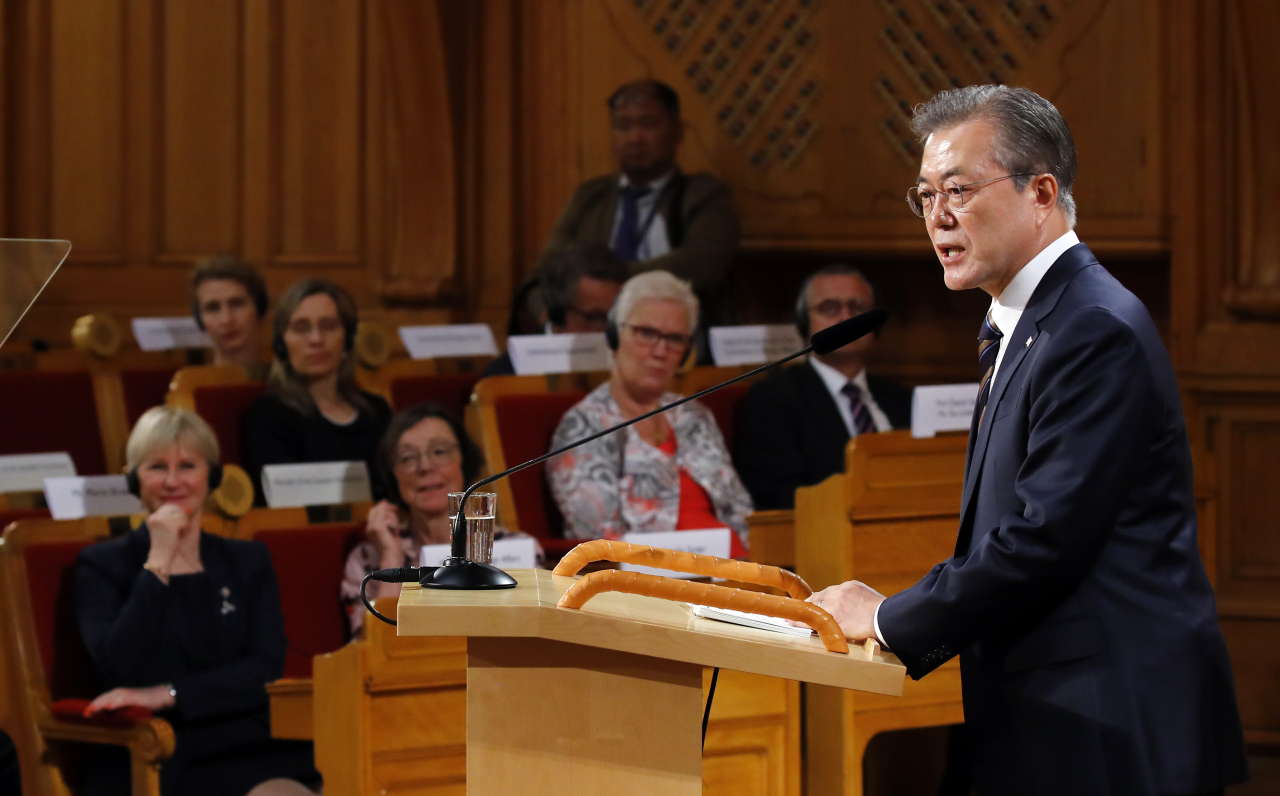President Moon Jae-in has returned back from a three-nation tour of Europe, but his comments regarding North Korea have gained more public attention than Seoul’s relationship with Nordic countries.
On the tour to Finland, Norway and Sweden, Moon not only put a timeline on his desired meeting with Kim Jong-un, but also urged Pyongyang to take concrete steps, while voicing his views on the groundwork necessary for US-North Korea dialogue.
“(I think) working-level negotiations should be held before (the US-North Korea summit) for concrete progress in negotiations between the two countries,” Moon said, at a press conference that followed the summit meeting with Swedish Prime Minister Stefan Lofven on Saturday.
“A meeting between the two leaders should be held on the foundations of working-level negotiations to prevent a repeat of parting without reaching an agreement like at the second (US-North Korea) summit in Hanoi.”
At the press conference, he also stated that the two Koreas are “communicating through diverse channels,” prompting speculations that they may be discussing the proposed fourth inter-Korean summit.
Moon had proposed holding another meeting with Kim in April, and repeated the call last week during his trip to Northern Europe.
Speaking in Oslo on Wednesday, Moon said that he was ready to meet Kim at any time, and that it would be desirable to meet him before he meets with US President Donald Trump at the end of June.
Trump is set to visit Seoul to meet with Moon at the end of the month, when he will attend the Group of 20 Summit in Osaka, Japan.
Moon also said that arranging a summit in such a short timeframe is possible, citing his second meeting with Kim last year. On May 26 last year, he met Kim met the North’s side of Panmunjom, just over a month after their first meeting at the border village on April 19. At the time, Cheong Wa Dae announced the meeting after it had taken place.
Moon’s comments during his tour of the Nordic nations also prompted views that there may be some changes in Seoul’s balance between Pyongyang and Washington.
While he has been accused by South Korean conservatives as advocating North Korea’s views, his speech at the Swedish parliament hinted he acknowledged a need for Pyongyang to take more action.
In his speech, Moon emphasized the need for trust between the people of both Koreas, trust in dialogue as the means to achieve peace, and for North Korea to earn the international community’s trust.
“North Korea must substantially show to the international community its commitment to completely dismantling its nuclear weapons and establish a peace regime,” he said.
“Dialogues with the outside world, whether they are bilateral or multilateral, must go on until North Korea earns the trust of the international community.”
Moon’s speech has been taken by some as being indicative of Seoul taking a stance closer to that of Washington than Pyongyang. While Washington has maintained that sanctions relief will follow concrete denuclearization steps, Pyongyang calls for “action for action” progress in which it eases sanctions in stages in return for the denuclearization.
While such disparity has always existed in Washington and Pyongyang’s views, the gap proved critical in the second US-North Korea summit held in Hanoi in February. The summit ended without any agreement being reached, and led to each party accusing the other for its failure.
Speculations on another US-North Korea summit were fanned by Trump’s revelation that he received a letter from Kim last year.
On Tuesday, he revealed that he had received a letter from Kim, describing it as “very personal, very warm, very nice.”
The US president also said that he believes “something will happen that’s going to be very positive,” and that a third summit with Kim is a possibility.
Earlier the same day, US national security advisor John Bolton commented that the meeting is “entirely possible” but that Kim holds the key to moving Washington to take such a step.
However, despite comments from South Korean and US leaders who raised hopes for resumption of a dialogue with North Korea, the US appears to be maintaining its position on North Korea.
According to Radio Free Asia, the US Department of State repeated the standard statement that it will “continue to closely coordinate with allies and partners on achieving the world’s shared goal of the final, fully verified denuclearization of North Korea,” in response to Moon’s speech.
Trump, despite earlier comments, also does not appear to be ready to change his stance.
On a number of occasions he has said that he is in “no rush” to deal with North Korea, saying that the country has ceased nuclear and long-range missile testing since he engaged with the regime.
He has also downplayed the significance of the North’s recent projectiles, and attempts to bypass sanctions.
“Everybody tries to break sanctions, but the sanctions are hurting them badly,” Trump said in a phone interview with Fox News.
He went on to highlight changes in North Korea’s stance -- namely the lack of nuclear and intercontinental ballistic missile tests -- since he took office, emphasizing, “We’ll take it nice and easy.”
By Choi He-suk (
cheesuk@heraldcorp.com)







![[Today’s K-pop] Blackpink’s Jennie, Lisa invited to Coachella as solo acts](http://res.heraldm.com/phpwas/restmb_idxmake.php?idx=644&simg=/content/image/2024/11/21/20241121050099_0.jpg)
